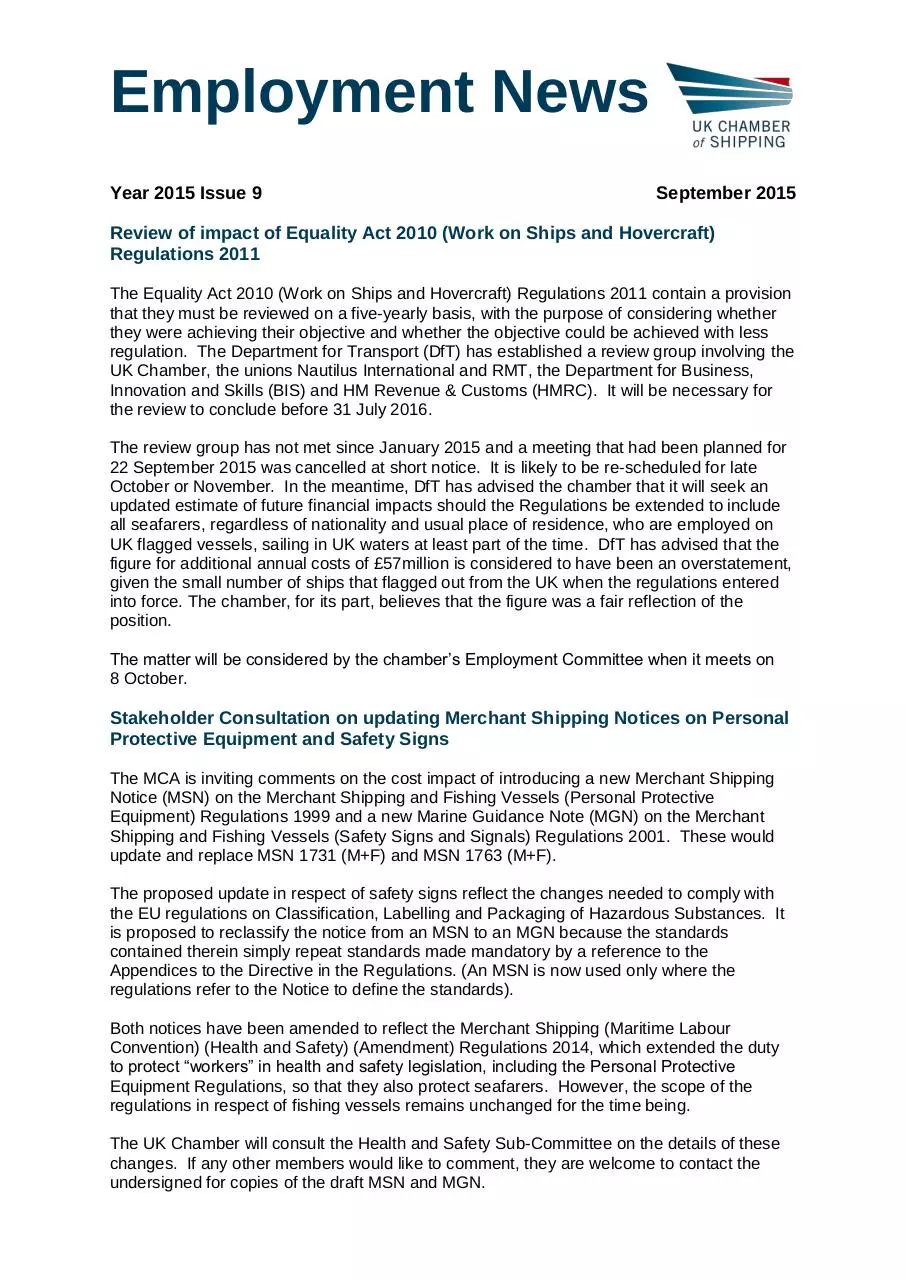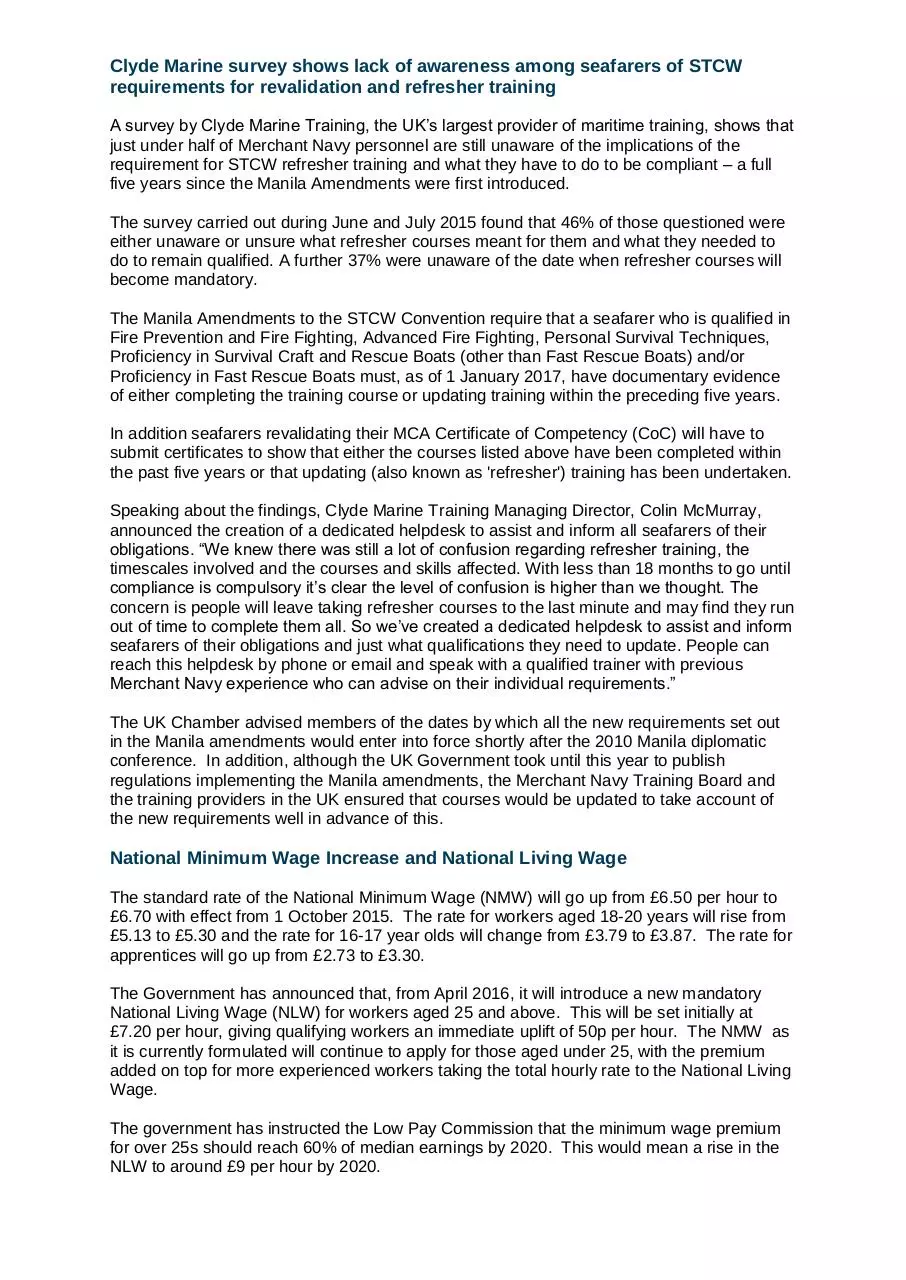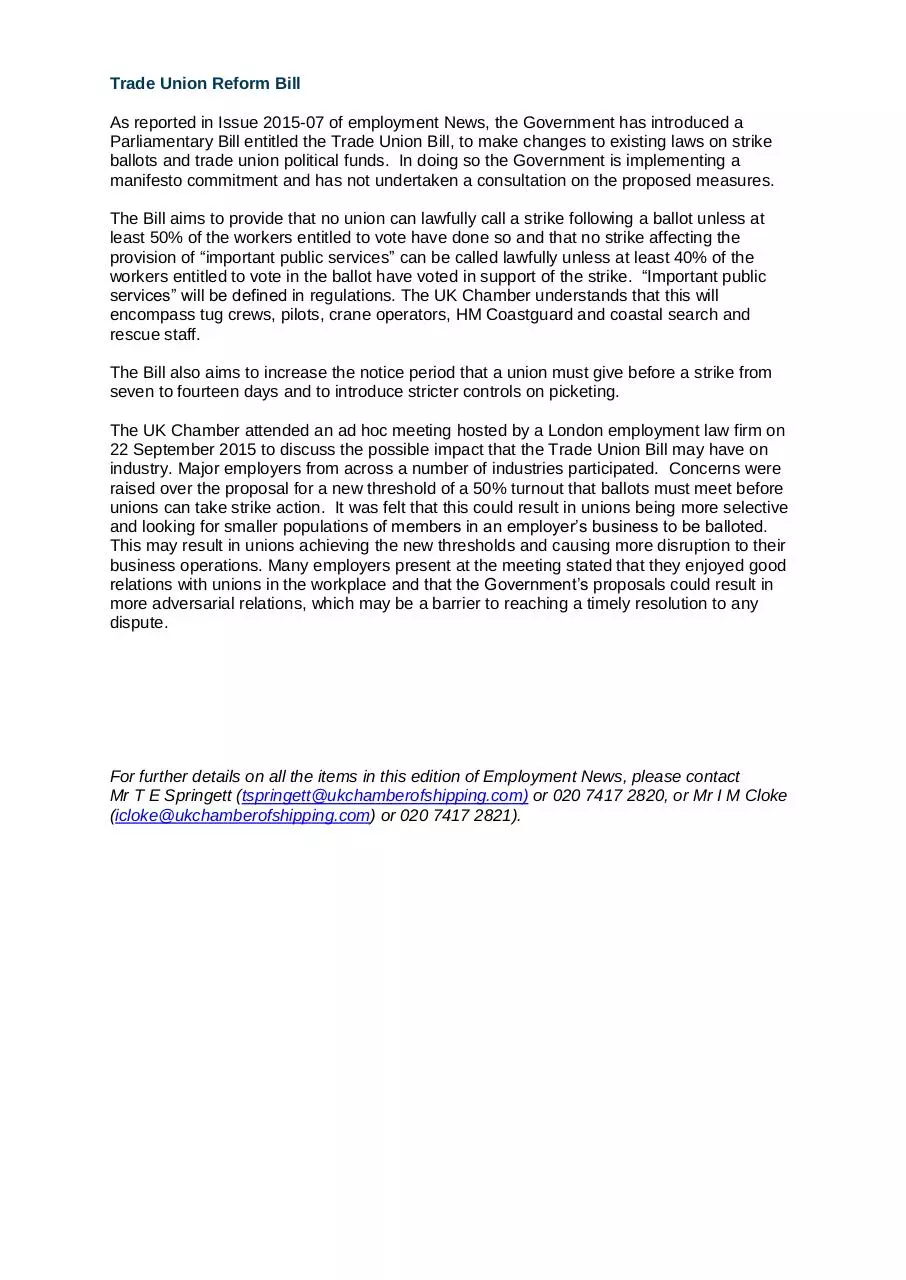EMPN2015 Issue 2015 9 (PDF)
File information
This PDF 1.5 document has been generated by , and has been sent on pdf-archive.com on 25/09/2015 at 12:05, from IP address 141.0.x.x.
The current document download page has been viewed 509 times.
File size: 183.84 KB (5 pages).
Privacy: public file





File preview
Employment News
Year 2015 Issue 9
September 2015
Review of impact of Equality Act 2010 (Work on Ships and Hovercraft)
Regulations 2011
The Equality Act 2010 (Work on Ships and Hovercraft) Regulations 2011 contain a provision
that they must be reviewed on a five-yearly basis, with the purpose of considering whether
they were achieving their objective and whether the objective could be achieved with less
regulation. The Department for Transport (DfT) has established a review group involving the
UK Chamber, the unions Nautilus International and RMT, the Department for Business,
Innovation and Skills (BIS) and HM Revenue & Customs (HMRC). It will be necessary for
the review to conclude before 31 July 2016.
The review group has not met since January 2015 and a meeting that had been planned for
22 September 2015 was cancelled at short notice. It is likely to be re-scheduled for late
October or November. In the meantime, DfT has advised the chamber that it will seek an
updated estimate of future financial impacts should the Regulations be extended to include
all seafarers, regardless of nationality and usual place of residence, who are employed on
UK flagged vessels, sailing in UK waters at least part of the time. DfT has advised that the
figure for additional annual costs of £57million is considered to have been an overstatement,
given the small number of ships that flagged out from the UK when the regulations entered
into force. The chamber, for its part, believes that the figure was a fair reflection of the
position.
The matter will be considered by the chamber’s Employment Committee when it meets on
8 October.
Stakeholder Consultation on updating Merchant Shipping Notices on Personal
Protective Equipment and Safety Signs
The MCA is inviting comments on the cost impact of introducing a new Merchant Shipping
Notice (MSN) on the Merchant Shipping and Fishing Vessels (Personal Protective
Equipment) Regulations 1999 and a new Marine Guidance Note (MGN) on the Merchant
Shipping and Fishing Vessels (Safety Signs and Signals) Regulations 2001. These would
update and replace MSN 1731 (M+F) and MSN 1763 (M+F).
The proposed update in respect of safety signs reflect the changes needed to comply with
the EU regulations on Classification, Labelling and Packaging of Hazardous Substances. It
is proposed to reclassify the notice from an MSN to an MGN because the standards
contained therein simply repeat standards made mandatory by a reference to the
Appendices to the Directive in the Regulations. (An MSN is now used only where the
regulations refer to the Notice to define the standards).
Both notices have been amended to reflect the Merchant Shipping (Maritime Labour
Convention) (Health and Safety) (Amendment) Regulations 2014, which extended the duty
to protect “workers” in health and safety legislation, including the Personal Protective
Equipment Regulations, so that they also protect seafarers. However, the scope of the
regulations in respect of fishing vessels remains unchanged for the time being.
The UK Chamber will consult the Health and Safety Sub-Committee on the details of these
changes. If any other members would like to comment, they are welcome to contact the
undersigned for copies of the draft MSN and MGN.
Caribbean MOU launches concentrated inspection campaign on ‘Safety of
Navigation and Hours of Work or Rest’
The Caribbean Memorandum of Understanding (MoU) on Port State Control will be holding a
Concentrated Inspection Campaign (CIC) on ‘Safety of Navigation and Hours of Work or
Rest’. It will be held for three months, from 1 September to 30 November 2015.
It is understood by the UK Chamber that Port State Control Officers (PSCOs) will focus on
verifying compliance with SOLAS Chapter V (Safety of Navigation) and the hours of rest
requirements found in Chapter VIII (Watchkeeping) of the STCW Convention, as amended.
The Caribbean MoU has not issued a standard questionnaire to be used by PSCOs during
the CIC. Further information can be found on the Caribbean MoU website:
www.caribbeanmou.org.
The UK Chamber considers it important that members are prepared for this campaign when
trading to ports in the Caribbean region of the CIC. Any difficulties encountered during the
CIC can be reported to the undersigned.
Code of Safe Working Practices for Merchant Seafarers – 2015 Edition
The Maritime and Coastguard Agency (MCA) launched the new Code of Safe Working
Practices for Merchant Seafarers at a reception at the Foreign Office as part of LISW. As
part of the comprehensive review, the UK Chamber participated on the working group and
was represented by Eddie Perkins, Alan Goodden and Ian Cloke.
The Code is published by MCA as best practices guidance for improving health and safety
on board ship. It details the regulatory framework for health and safety on board ship, safety
management and identifies statutory duties underlying the advice in the Code, and includes
the areas that should be covered when introducing a new recruit to the safety procedures on
board.
The main changes from the previous Code include:
New title which reflects the terminology used in the Code.
Increased emphasis on practical guidance rather than legislation.
Improved guidance on risk assessment.
Simplified advice on permits to work.
Dangerous (Enclosed) Space chapter updated.
New content on good safety culture, fatigue and ergonomics.
Revised chapter on vessels serving offshore oil and gas.
Streamlined format – sections removed and now A4.
It is intended to revoke the prescriptive requirement for the number of copies of the Code to
be carried on UK ships and replace this with a duty to ensure that the Code is easily
accessible and readily available to all seafarers on board. This change is expected to come
into force in October 2015.
Printed copies of the latest edition are available by writing to TSO, Customer Services, PO
Box 29, Norwich NR3 1GN; or by telephoning +44 (0) 333 202 5070; or fax +44 (0) 333 202
5080; or by emailing customer.services@tso.co.uk . Alternatively the latest edition can be
ordered online at www.tsoshop.co.uk where a list of all TSO Agents can be found; or from
any reputable book seller.
Clyde Marine survey shows lack of awareness among seafarers of STCW
requirements for revalidation and refresher training
A survey by Clyde Marine Training, the UK’s largest provider of maritime training, shows that
just under half of Merchant Navy personnel are still unaware of the implications of the
requirement for STCW refresher training and what they have to do to be compliant – a full
five years since the Manila Amendments were first introduced.
The survey carried out during June and July 2015 found that 46% of those questioned were
either unaware or unsure what refresher courses meant for them and what they needed to
do to remain qualified. A further 37% were unaware of the date when refresher courses will
become mandatory.
The Manila Amendments to the STCW Convention require that a seafarer who is qualified in
Fire Prevention and Fire Fighting, Advanced Fire Fighting, Personal Survival Techniques,
Proficiency in Survival Craft and Rescue Boats (other than Fast Rescue Boats) and/or
Proficiency in Fast Rescue Boats must, as of 1 January 2017, have documentary evidence
of either completing the training course or updating training within the preceding five years.
In addition seafarers revalidating their MCA Certificate of Competency (CoC) will have to
submit certificates to show that either the courses listed above have been completed within
the past five years or that updating (also known as 'refresher') training has been undertaken.
Speaking about the findings, Clyde Marine Training Managing Director, Colin McMurray,
announced the creation of a dedicated helpdesk to assist and inform all seafarers of their
obligations. “We knew there was still a lot of confusion regarding refresher training, the
timescales involved and the courses and skills affected. With less than 18 months to go until
compliance is compulsory it’s clear the level of confusion is higher than we thought. The
concern is people will leave taking refresher courses to the last minute and may find they run
out of time to complete them all. So we’ve created a dedicated helpdesk to assist and inform
seafarers of their obligations and just what qualifications they need to update. People can
reach this helpdesk by phone or email and speak with a qualified trainer with previous
Merchant Navy experience who can advise on their individual requirements.”
The UK Chamber advised members of the dates by which all the new requirements set out
in the Manila amendments would enter into force shortly after the 2010 Manila diplomatic
conference. In addition, although the UK Government took until this year to publish
regulations implementing the Manila amendments, the Merchant Navy Training Board and
the training providers in the UK ensured that courses would be updated to take account of
the new requirements well in advance of this.
National Minimum Wage Increase and National Living Wage
The standard rate of the National Minimum Wage (NMW) will go up from £6.50 per hour to
£6.70 with effect from 1 October 2015. The rate for workers aged 18-20 years will rise from
£5.13 to £5.30 and the rate for 16-17 year olds will change from £3.79 to £3.87. The rate for
apprentices will go up from £2.73 to £3.30.
The Government has announced that, from April 2016, it will introduce a new mandatory
National Living Wage (NLW) for workers aged 25 and above. This will be set initially at
£7.20 per hour, giving qualifying workers an immediate uplift of 50p per hour. The NMW as
it is currently formulated will continue to apply for those aged under 25, with the premium
added on top for more experienced workers taking the total hourly rate to the National Living
Wage.
The government has instructed the Low Pay Commission that the minimum wage premium
for over 25s should reach 60% of median earnings by 2020. This would mean a rise in the
NLW to around £9 per hour by 2020.
The Government’ NLW is a separate concept to the voluntary Living Wage rate calculated by
the Living Wage Foundation. The Government rate is based on median earnings, whereas
the Living Wage Foundation rate is calculated according to the cost of living. The latter is
currently £7.85 an hour, with a separate London Living Wage of £9.15 an hour.
Court ruling: Travelling time for some peripatetic workers is working time
The Court of Justice of the European Union (CJEU), in a landmark ruling1, has decided that
the time spent by mobile workers who have no fixed place of work travelling between home
and their first and last place of work each day counts as working time under the Working
Time Directive.
The CJEU was asked to rule in respect of a claim against a company whose business
involves the installation of anti-theft devices. Its employees are required to carry out their
work at the premises of clients, rather than at a fixed place of work. They challenged the
company’s position that the time spent travelling from home to the first call of their day, as
well as from the last call of the day back to their homes, as a rest period and not as working
time.
The CJEU ruled that, where workers do not have a fixed or habitual place of work, the time
they spend travelling between their homes and the premises of the first and last customers
designated by their employers constitutes working time within the meaning of the Working
Time Directive. The court considers such workers to be carrying out their activity or duties
over the whole duration of those journeys. It also considers that they are at their employer’s
disposal at such times, as the employer may change or cancel the instructions given to a
worker at any time. The workers are not at liberty to use their time freely and pursue their
own interests whilst en route.
The ruling may affect workers such as service engineers, mobile gas fitters, care workers
and sales representatives. It is not expected to affect workers who have a permanent office,
although it may do if they are instructed by their employer to work at a different site on a
particular day.
The main effect will be that hours spent travelling to the first call and home from the last call
will need to be taken into account in the calculation of a worker’s weekly working time. It is
also possible that the ruling will be used to challenge pay rates. Time spent travelling to and
from work is not classed as working time under the UK’s National Minimum Wage Act 1998,
but this could be called into question if a worker finds that taking account of travelling time in
accordance with the ECJ ruling means that his or her hourly rate of pay falls short of the
level of the National Minimum Wage.
In addition, employers whose employees are protected by section 1 of the Employment
Rights Act 1996 may consider it necessary to review the written particulars provided to
employees who do not have a fixed place of work.
The case will not affect the shipping industry directly, since shipping is not subject to the
Working Time Directive but the European Agreement on Working Time for Seafarers. The
definition of hours of work under the later differs from the definition of working time under the
former – seafarers’ hours of work are defined as hours when the seafarer is performing work
on account of the ship. Hence a challenge on the basis that time spent travelling by
seafarers to join their ships should be counted as hours of work may have less chance of
succeeding.
1
Federación de Servicios Privados del sindicato Comisiones obreras (CC.OO.) v Tyco Integrated
Security SL, Tyco Integrated Fire & Security Corporation Servicios SA, Case C-266/14
Trade Union Reform Bill
As reported in Issue 2015-07 of employment News, the Government has introduced a
Parliamentary Bill entitled the Trade Union Bill, to make changes to existing laws on strike
ballots and trade union political funds. In doing so the Government is implementing a
manifesto commitment and has not undertaken a consultation on the proposed measures.
The Bill aims to provide that no union can lawfully call a strike following a ballot unless at
least 50% of the workers entitled to vote have done so and that no strike affecting the
provision of “important public services” can be called lawfully unless at least 40% of the
workers entitled to vote in the ballot have voted in support of the strike. “Important public
services” will be defined in regulations. The UK Chamber understands that this will
encompass tug crews, pilots, crane operators, HM Coastguard and coastal search and
rescue staff.
The Bill also aims to increase the notice period that a union must give before a strike from
seven to fourteen days and to introduce stricter controls on picketing.
The UK Chamber attended an ad hoc meeting hosted by a London employment law firm on
22 September 2015 to discuss the possible impact that the Trade Union Bill may have on
industry. Major employers from across a number of industries participated. Concerns were
raised over the proposal for a new threshold of a 50% turnout that ballots must meet before
unions can take strike action. It was felt that this could result in unions being more selective
and looking for smaller populations of members in an employer’s business to be balloted.
This may result in unions achieving the new thresholds and causing more disruption to their
business operations. Many employers present at the meeting stated that they enjoyed good
relations with unions in the workplace and that the Government’s proposals could result in
more adversarial relations, which may be a barrier to reaching a timely resolution to any
dispute.
For further details on all the items in this edition of Employment News, please contact
Mr T E Springett (tspringett@ukchamberofshipping.com) or 020 7417 2820, or Mr I M Cloke
(icloke@ukchamberofshipping.com) or 020 7417 2821).
Download EMPN2015-Issue 2015-9
EMPN2015-Issue 2015-9.pdf (PDF, 183.84 KB)
Download PDF
Share this file on social networks
Link to this page
Permanent link
Use the permanent link to the download page to share your document on Facebook, Twitter, LinkedIn, or directly with a contact by e-Mail, Messenger, Whatsapp, Line..
Short link
Use the short link to share your document on Twitter or by text message (SMS)
HTML Code
Copy the following HTML code to share your document on a Website or Blog
QR Code to this page

This file has been shared publicly by a user of PDF Archive.
Document ID: 0000303403.